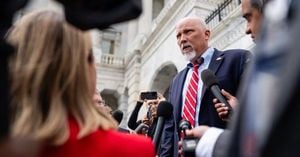Mexican authorities have made significant strides against one of the world's most notorious drug trafficking organizations with the recent arrests of two high-ranking members of the Sinaloa Cartel. This crackdown takes place just days before the United States formally declared the Sinaloa Cartel and several other criminal entities from Mexico as "terrorist organizations." The arrests are part of broader efforts to combat organized crime and the violence it incites.
The two arrested individuals are José Ángel Canobbio Iñzunza and Kevin Alonso "N". Canobbio Iñzunza was apprehended on Wednesday during operations orchestrated by the Mexican military and national defense forces in Culiacán, located within the Sinaloa state. He is known to be the right-hand man to one of Joaquín Guzmán's sons, often referred to as "El Chapo," the infamous leader of the cartel who is currently serving life imprisonment. U.S. authorities have issued felony charges against Canobbio, predominantly related to producing and trafficking cocaine and fentanyl across the U.S. border.
On Thursday, the second suspect, Kevin Alonso "N," was also arrested as part of the coordinated effort to dismantle cartel operations. Omar Hamid García Harfuch, Mexico’s Minister of Security and Citizens' Protection, stated, "The arrests and operations will continue with the aim of reducing violence in Sinaloa caused by criminal organizations." This commitment by the Mexican government signals firmness against the continuous threat posed by such powerful drug trafficking syndicates.
The Sinaloa Cartel, which has long been one of the leading groups within the global drug trade, continues to exert considerable influence over drug routes between Mexico and the U.S. Even after the capture of Guzmán, the cartel has adapted, maintaining its operations mainly due to its extensive network and the loyalty it commands among affiliates. It is reported to control significant portions of the drug trafficking from Mexico to the U.S., making it pivotal to the drug supply chain.
This recent arrest occurs against the backdrop of rising tensions between Mexico and the U.S. as the U.S. government aims to tighten its grip on organizations responsible for the drug epidemic affecting various states. By officially designatively labeling the Sinaloa Cartel as terrorists, the U.S. opens pathways for potentially stricter sanctions, including asset freezes and restrictions on financial transactions linked to members of the cartel.
According to officials, the arrests will not only target key figures within the cartel but also aim to identify and dismantle the operations supporting their illicit activities. The Mexican government, recognizing the necessity of reducing violence perpetuated by such criminal factions, has ramped up its collaborative initiatives with the U.S. to confront drug trafficking effectively.
This escalation of law enforcement actions has already been met with reactions from various quarters, expressing optimism about the potential for change. The designation of the Sinaloa Cartel as a terrorist organization may also facilitate enhanced cooperation with the U.S. law enforcement agencies, emphasizing the urgency to tackle these rampant criminal networks.
Experts predict the latest operational shifts by the Mexican government could lead to intensified violence as cartels may retaliate against crackdowns impacting their infrastructure. It might signify changes not just for the Sinaloa Cartel but for broader dynamics of organized crime in Mexico, which has been characterized by decades of power struggles and violent confrontations between competing drug groups.
While these arrests are commendable, the complexity of the problem remains as the skills, resources, and money behind these drug trafficking organizations make them resilient. The apprehension of Canobbio and Alonso signifies just one chapter within the larger narrative of Mexico's fight against drug-related crime, yet its effectiveness will be judged by the sustained efforts to disrupt the crux of the cartels and their operations.
Through these maneuvers, the Mexican authorities continue to send the message both domestically and internationally: they are committed to combatting the violence tied to organized crime and protecting citizens from the fallout of drug trafficking. The recent arrests serve to bolster perceptions of governmental resolve but also hint at the challenges still posed by institutions like the Sinaloa Cartel, which has shown remarkable tenacity and adaptability over the decades.
Only time will tell how these developments will influence the broader socio-political landscapes within Mexico and its relationship with the United States as they collectively face this persistent challenge. The arrest of leaders within such organizations may lead to immediate gains; the long-term effects and stability will rely on sustained pressure and strategic planning to overcome the resulting retaliatory violence from the cartels.



